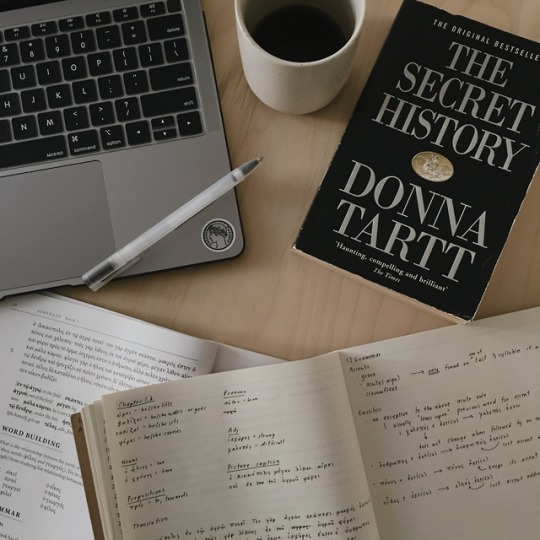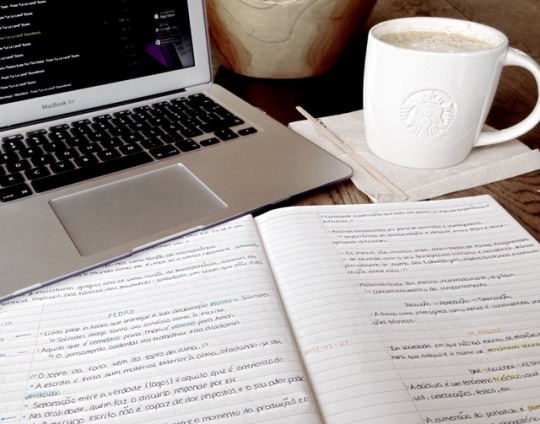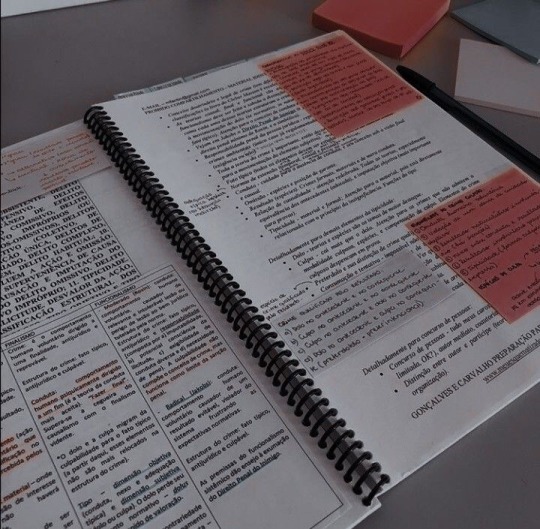Text
i'm so proud of everyone on my dash whether you’re going to college, applying for a job, becoming more confident with yourself, getting rid of some negativity in your life, writing a story, or simply getting out of bed in the morning and making yourself a cup of coffee. i’m so proud of everyone’s achievements, big or small. you’re all so special. i’m glad that i get glimpses into your lives because it makes me happy to see you all prosper <33
18K notes
·
View notes
Photo


colder weather calls for black coffee and beautiful architecture. what’s your favorite autumn activity?
5K notes
·
View notes
Photo


2017-03-28
Another morning at Starbucks ☕️ It’s so cozy and my hazelnut 🌰 latte was so delicious I didn’t want to leave!!
+ got some revision done 📖✍🏼
11K notes
·
View notes
Photo

28.09.2021
picture of my cappuccino from a cute reading cafe I went to :)
work is really beginning to pile up!! doing epq and my other 3 subjects is definitely more tiring than I originally thought, but im enjoying it? epq has made me feel more secure in my future plans as im doing it on the history and impact of hangul, and I am seriously enjoying it so much. hard to get some info, but hey!
#coffee#cappuccino#cafe#the reading cafe#alevels#epq#cafe aesthetic#study aesthetic#brown aesthetic#watched uni students moving in#hey ill be doing that in a few years lol#really threw me off tbh#have a good day :D
7 notes
·
View notes
Photo

Settling in:
I know things are different for each sixth form/college, but at my college the first three weeks were easy academically - we had lots of frees and not much work to do! Take advantage of this time and stay on top of the homework that you do have so you can start the year the right way.
Remember that everyone is in the same boat as you - I knew two girls who were going to my college! Lots of people will know more people than you do, but remember that they want to make new friends too so they won’t ignore you!
You’re not expected to know lots of extra things! I was worried that because I hadn’t taken Additional Maths at GCSE I wouldn’t know a lot of the maths course. However the teachers don’t expect you to know everything and will be happy to spend time getting everyone to the same level.
Doing well academically:
The first year of a-levels is hard! Many people find it hard to use all of their free periods wisely, so I found it helpful to allocate some to studying and some to hanging out with friends. This way you don’t feel guilty about being with your friends but you also have set times to catch up on homework. Try to get some structure into your timetable and experiment to find what works for you.
Make notes as you go along!!!!! I cannot stress enough how important it is that at the end of every chapter/topic, you go home, collate all your resources together and write notes that you can revise from and understand in one/two year’s time! By spending an hour every week throughout the year doing this, you’re saving tens of hours at the end of the year!
Revise as you go along - on a similar level, try and find the time to revise past content as you go along. It’s not the end of the world if you don’t mangae this (I haven’t so far!) but it will help to get all the information into your long term memory so that you don’t have to revise so much at tht end of the year.
To make revision easier, try to understand what you’re learning as you go along. If you don’t understand chapter one of maths, you’ll never understand chapter ten! Think of chapters like building blocks, you need all the previous ones intact before you can start on the next.
Don’t get worried about bad grades - at the start of a-levels everyone will get some bad grades, and some people will still get bad grades up until a few months before the exams when everything will just click for them and fall into place. Keep following the tips above and eventually a-levels will become your friend!
Friendships and social life:
You’ll naturally gravitate to friendship groups - and you might not end up in the group you thought you would when you started at college.
It’s not the end of the world not to have best friends. Very few people have a best friend where the feeling is reciprocated between them - most people find it works better to have some close friends and then many other friends as well!
Work at old friendships - if there are people you want to stay in contact with from your old school, message them every few months and ask how they’re doing and if they want to meet up in a place that’s convenient for both of you!
Friendships take time to build and they will ebb and flow throughout the year. Make some memories but remember that you’re there to study, work hard and get the best grades that you can.
I hope this was helpful for your AS year! Good luck and remember that everything will be okay in the end. If it’s not okay, it’s not the end.
563 notes
·
View notes
Text
ok u know what. golden hour is great and all, but u know what time of day is super underappreciated??? BLUE hour



that time of day right after the sun sets or right before it rises…. *chef kiss* love that
234K notes
·
View notes
Photo

19.09.21
picture of my friends’ death of a salesman notes :)
first full week done, ready for my second! things feel crazy and rushed but I love my lessons, especially English language!! we've barely started history and sociology but I do like them as well :) I dropped literature immediately, but I feel a lot more relaxed now so definitely a good move! I also got onto the epq, and as of right now my projects gonna be on the history and of hangul and im so so so excited to get started!!
it is Sunday right now, and no matter how glad I am for a break I do hate Sundays quite a lot. I always feel so low and unmotivated, especially if I don't see friends Saturday. so im just trying to relax with the seventeen live thing before I get a move on with some homework :)
have a great day!
#aesthetic#studying#studyblr#new studyblr#epq#annotations#study motivation#sixth form#alevels#alevel english#study aesthetic#study blog#quackstudies#brain go brrr#death of a salesman#blue highlighter
18 notes
·
View notes
Note
I've been nostalgic lately about reading fantasy novels. All the good ones I know of are either over or the authors might die before finishing the series (ASOIAF, Kingkiller). I'm also anxious reading is getting less popular and no new well written fantasy books will be written. Do you have this anxiety too? Do you have some suggestions for well written fantasy? (I'm in my 20s now)
I get what you mean, but I also think we often have a tendency to glorify older books (especially in comparison to newer ones) and put them up on a pedestal. This is true for so many classics too! Yes, it's unlikely that the same flavour of fantasy will be published anytime soon, but what will be published is a different era of the genre that I don't think necessarily equates to lower quality. And even if it's not your cup of tea, there are endless older series out there to get through that are 100% complete!
Here are a few:
The Dune series by Frank Herbert
The Wheel of Time series by Robert Jordan
Foundation series by Isaac Asimov
Téméraire series by Naomi Novik
The Lies of Lock Lamora by Scott Lynch
Mistborn series by Brandon Sanderson
The Earthsea Cycle by Ursula Le Guin
67 notes
·
View notes
Text

이 사진을 편집하는데 30분이 걸렸다. 이 사진을 못생겼어요. ☹️
the photo quality turned out quite bad bc i took it at night :" had to compensate with this sparkly-golden-hour-effect on the app, but it kinda looks nice like this?
103 notes
·
View notes
Text
How to learn a language when you don’t know where to start:
General Plan:
Weeks 1 and 2:
Purpose:
Learn the fundamentals sentence construction
Learn how to spell and count
Start building a phrase stockpile with basic greetings
The Alphabet
Numbers 1 - 100
Subject Pronouns
Common Greetings
Conjugate the Two Most Important Verbs: to be and to have
Basic Definite and Indefinite Articles
Weeks 3 and 4:
Purpose:
Learn essential vocabulary for the day-to-day
Start conjugating regular verbs
Days of the Week and Months of the Year
How to tell the time
How to talk about the weather
Family Vocabulary
Present Tense Conjugations Verbs
Weeks 5 and 6:
Purpose:
Warm up with the last of the day-to-day vocabulary
Add more complex types of sentences to your grammar
Colours
House vocabulary
How to ask questions
Present Tense Conjugations Verbs
Forming negatives
Weeks 7 and 8:
Purpose:
Learn how to navigate basic situations in a region of your target language country
Finish memorising regular conjugation rules
Food Vocabulary and Ordering at Restaurants
Money and Shopping Phrases
Present Tense Conjugations Verbs
Weeks 9 and 10:
Purpose:
Start constructing descriptive and more complex sentences
Adjectives
Reflective verbs
Places vocabulary
Weeks 11 and 12:
Purpose:
Add more complex descriptions to your sentences with adverbs
Wrap up vocabulary essentials
Adverbs
Parts of the body and medical vocabulary
Tips for Learning a Foreign Language:
Learning Vocabulary:
What vocabulary should I be learning?
There are hundreds of thousands of words in every language, and the large majority of them won’t be immediately relevant to you when you’re starting out.Typically, the most frequent 3000 words make up 90% of the language that a native speaker uses on any given day. Instead try to learn the most useful words in a language, and then expand outwards from there according to your needs and interests.
Choose the words you want/need to learn.
Relate them to what you already know.
Review them until they’ve reached your long-term memory.
Record them so learning is never lost.
Use them in meaningful human conversation and communication.
How should I record the vocabulary?
Learners need to see and/or hear a new word of phrase 6 to 17 times before they really know a piece of vocabulary.
Keep a careful record of new vocabulary.
Record the vocabulary in a way that is helpful to you and will ensure that you will practice the vocabulary, e.g. flashcards.
Vocabulary should be organised so that words are easier to find, e.g. alphabetically or according to topic.
Ideally when noting vocabulary you should write down not only the meaning, but the grammatical class, and example in a sentence, and where needed information about structure.
How should I practice using the vocabulary?
Look, Say, Cover, Write and Check - Use this method for learning and remembering vocabulary. This method is really good for learning spellings.
Make flashcards. Write the vocabulary on the front with the definition and examples on the back.
Draw mind maps or make visual representations of the new vocabulary groups.
Stick labels or post it notes on corresponding objects, e.g when learning kitchen vocabulary you could label items in your house.
How often should I be practising vocabulary?
A valuable technique is ‘the principle of expanding rehearsal’. This means reviewing vocabulary shortly after first learning them then at increasingly longer intervals.
Ideally, words should be reviewed:
5-10 minutes later
24 hours later
One week later
1-2 months later
6 months later
Knowing a vocabulary item well enough to use it productively means knowing:
Its written and spoken forms (spelling and pronunciation).
Its grammatical category and other grammatical information
Related words and word families, e.g. adjective, adverb, verb, noun.
Common collocations (Words that often come before or after it).
Receptive Skills: Listening and Reading
Reading is probably one of the most effective ways of building vocabulary knowledge.
Listening is also important because it occupies a big chunk of the time we spend communicating.
Tips for reading in a foreign language:
Start basic and small. Children’s books are great practice for beginners. Don’t try to dive into a novel or newspaper too early, since it can be discouraging and time consuming if you have to look up every other word.
Read things you’ve already read in your native language. The fact that you at least know the gist of the story will help you to pick up context clues, learn new vocabulary and grammatical constructions.
Read books with their accompanying audio books. Reading a book while listening to the accompanying audio will improve your “ear training”. It will also help you to learn the pronunciation of words.
Tips for listening in a foreign language:
Watch films in your target language.
Read a book while also listening along to the audio book version.
Listen to the radio in your target language.
Watch videos online in your target language.
Activities to do to show that you’ve understood what you’ve been listening to:
Try drawing a picture of what was said.
Ask yourself some questions about it and try to answer them.
Provide a summary of what was said.
Suggest what might come next in the “story.”
Translate what was said into another language.
“Talk back” to the speaker to engage in imaginary conversation.
Productive Skills: Speaking and Writing
Tips for speaking in a foreign language:
If you can, try to speak the language every day either out loud to yourself or chat to another native speaker whether it is a colleague, a friend, a tutor or a language exchange partner.
Write a list of topics and think about what you could say about each one. First you could write out your thoughts and then read them out loud. Look up the words you don’t know. You could also come up with questions at the end to ask someone else.
A really good way to improve your own speaking is to listen to how native speakers talk and imitate their accent, their rhythm of speech and tone of voice. Watch how their lips move and pay attention to the stressed sounds. You could watch interviews on YouTube or online news websites and pause every so often to copy what you have just heard. You could even sing along to songs sung in the target language.
Walk around the house and describe what you say. Say what you like or dislike about the room or the furniture or the decor. Talk about what you want to change.This gets you to practise every day vocabulary.
Tips for writing in a foreign language:
Practice writing in your target language. Keep it simple to start with. Beginner vocabulary and grammar concepts are generally very descriptive and concrete.
Practice writing by hand. Here are some things you can write out by hand:
Diary entries
Shopping lists
Reminders
What could I write about?
Write about your day, an interesting event, how you’re feeling, or what you’re thinking.
Make up a conversation between two people.
Write a letter to a friend, yourself, or a celebrity. You don’t need to send it; just writing it will be helpful.
Translate a text you’ve written in your native language into your foreign language.
Write a review or a book you’ve recently read or a film you’ve recently watched.
Write Facebook statuses, Tweets or Tumblr posts (whether you post them or not will be up to you).
Write a short story or poem.
Writing is one of the hardest things to do well as a non-native speaker of a language, because there’s no room to hide.
There are lots of ways to improve your writing ability, but they can be essentially boiled down to three key components:
Read a lot
Write a lot
Get your writing corrected
28K notes
·
View notes












